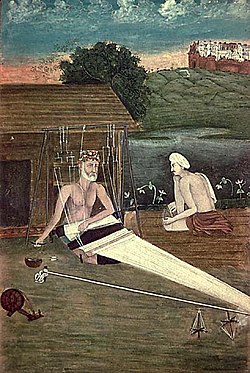Kabir Quote
The moon shines in my body, but my blind eyes cannot see it:The moon is within me, and so is the sun.The unstruck drum of Eternity is sounded within me; but my deaf ears cannot hear it.So long as man clamors for the I and the Mine, his works are as naught:When all love of the I and the Mine is dead, then the work of the Lord is done.For work has no other aim than the getting of knowledge:When that comes, then work is put away.The flower blooms for the fruit: when the fruit comes, the flower withers.The musk is in the deer, but is seeks it not within itself: it wanders in quest of grass.
Kabir
The moon shines in my body, but my blind eyes cannot see it:The moon is within me, and so is the sun.The unstruck drum of Eternity is sounded within me; but my deaf ears cannot hear it.So long as man clamors for the I and the Mine, his works are as naught:When all love of the I and the Mine is dead, then the work of the Lord is done.For work has no other aim than the getting of knowledge:When that comes, then work is put away.The flower blooms for the fruit: when the fruit comes, the flower withers.The musk is in the deer, but is seeks it not within itself: it wanders in quest of grass.
Related Quotes
About Kabir
Kabir (fl. 15th century): 14–15 was a well-known Indian devotional mystic poet and sant. His writings influenced Hinduism's Bhakti movement, and his verses are found in Sikhism's scripture Guru Granth Sahib, the Satguru Granth Sahib of Saint Garib Das, and Kabir Sagar of Dharamdas. Today, Kabir is an important figure in Hinduism, Sikhism and in Sufism. He was a disciple of Ramananda, the founder of the Ramanandi Sampradaya.
Born in the city of Varanasi in what is now Uttar Pradesh, he is known for being critical of organized religions. He questioned what he regarded to be the meaningless and unethical practices of all religions, primarily what he considered to be the wrong practices in Hinduism and Islam. During his lifetime, he was threatened by both Hindus and Muslims for his views. When he died, several Hindus and the Muslims he had inspired claimed him as theirs.
Kabir suggested that "truth" is with the person who is on the path of righteousness, who considers everything, living and non living, as divine, and who is passively detached from the affairs of the world. To know the truth, suggested Kabir, drop the "I", or the ego. Kabir's legacy survives and continues through the Kabir panth ("Path of Kabir"), Sant Mat sect that recognizes Kabir as its founder. Its members are known as Kabir panthis.
Born in the city of Varanasi in what is now Uttar Pradesh, he is known for being critical of organized religions. He questioned what he regarded to be the meaningless and unethical practices of all religions, primarily what he considered to be the wrong practices in Hinduism and Islam. During his lifetime, he was threatened by both Hindus and Muslims for his views. When he died, several Hindus and the Muslims he had inspired claimed him as theirs.
Kabir suggested that "truth" is with the person who is on the path of righteousness, who considers everything, living and non living, as divine, and who is passively detached from the affairs of the world. To know the truth, suggested Kabir, drop the "I", or the ego. Kabir's legacy survives and continues through the Kabir panth ("Path of Kabir"), Sant Mat sect that recognizes Kabir as its founder. Its members are known as Kabir panthis.
